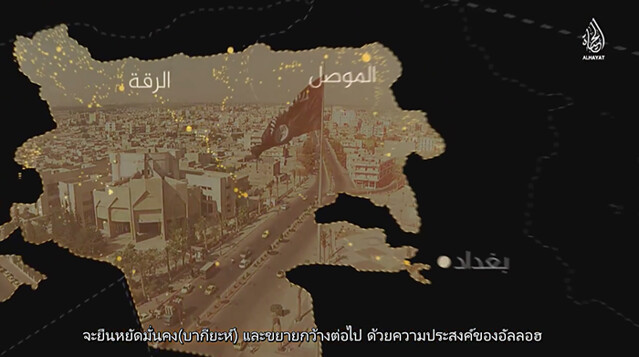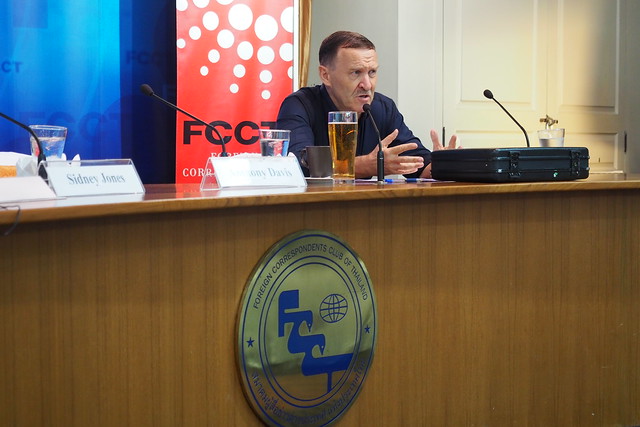Despite reports from Russian intelligence about ISIS members hiding in the country, security experts said that Thailand still has minimal risk of a spread of violence from the troubled Middle East. However, given the rise of Buddhist hardliners and security officers distracted by political dissidence, this might change.
On 28 November 2015, a four-minute video clip titled “No Respite” from al-Hayat, the media production wing of ISIS, was posted on YouTube under the account of a person named Millah Ibrahim. On the surface, the video with an Arabic voice-over might seem like a typical ISIS propaganda video, featuring its glorious looking fighters and the promised Caliphate. But the ISIS video now removed from YouTube was for the first time available with Thai subtitles.
According to Benar News, on 30 November, ‘From Inside Halab’, a second ISIS video with Thai subtitles, surfaced on a Thai-language Facebook Page titled ‘the Flames of War’, a phrase which also appears in ISIS media.
As hundreds of volunteers from Indonesia and Malaysia have already flocked to Syria to join ISIS, on Thursday evening, 3 December 2015, the Foreign Correspondents’ Club of Thailand (FCCT) held a discussion on ‘After Paris: How Strong is ISIS & its Allies in SE Asia?’ to assess the threat level of ISIS in Southeast Asia. The discussants at the event were Anthony Davis, Security Analyst at HIS Jane’s Defence Weekly, and Sidney Jones, a leading expert on jihadism in SEA from the Institute for Policy Analysis of Conflict (IPAC).

Part of a four-minute video clip titled “No Respite” from Al Hayat, a media production wing of ISIS, with Thai subtitles. The message reads “stay firm and expand for the will of Allah”.
“To the best of my knowledge, this is the first IS video that somebody in Thailand or further afield has taken the trouble to sit down and translate into Thai and attach subtitles to,” said Davis at the discussion in FCCT.
The security expert explained that the fact that currently the defence authorities under the military regime in Thailand are distracted by the activities of political dissidents, such as the anti-establishment red shirts and other pro-democracy groups, is one of the vulnerability factors that might feed into the ISIS threats.
Moreover, the presence of foreign businesses and tourists and not the international crimes in the country could make Thailand a tempting target for the jihadist militants. All these factors, together with Thailand’s protracted political turmoil and corruption, create a permissive environment for the possibility of ISIS operations in the kingdom.
Davis also pointed out that lax cooperation between Thailand and its ASEAN neighbours, Malaysia, Indonesia and the Philippines, on security issues related to militant jihadist groups is also another issue of concern. He added that currently the Thai security authorities are only ‘ticking the boxes’ when it comes to regional cooperation on security issues.
But despite the permissive environment and other factors, Davis concluded that the risk of the ISIS threat spilling over into Thailand or other mainland Southeast Asian countries is still small. “It seems to be highly unlikely that you’ll have young Thai Muslims, either Patani Malays or Thai-speaking Muslims, in the international jihadist campaign,” said Davis.

Anthony Davis, a Security Analyst from HIS Jane’s Defence Weekly discussing ISIS threats in Southeast Asia at the FCCT on 3 December 2015
Elaborating his conclusion, Davis said that Thailand is a secular state with a well-integrated Muslim population most of whom have been settled since the Ayutthaya period dating back several centuries and speak Thai as their first language apart from the Muslim population in the restive Deep South provinces of Yala, Pattani, and Narathiwat, who speak Malayu, a Malay dialect.
Moreover, Thailand is not involved in the military campaign against ISIS in the Middle East. This makes it less likely to be a target since up to now ISIS has tended to carry out attacks only on countries involved in the war efforts against it, such as France, Lebanon, and Turkey, Davis told the audience.
Although the armed conflict between the Thai state and the insurgent groups in the Deep South is approaching its 12th year, Davis said that the Barisan Revolusi Nasional (BRN), the most active insurgent group in Thailand’s Deep South, is on the contrary acting as a ‘bulwark’ against ISIS threats.
He said at the discussion “the BRN is obviously not buying into the jihadist agenda since it is well-integrated with the local society in the south.” He added that the BRN even perceives ISIS ambitions in the region as threats to its political agenda.
Nonetheless, as the Deep South conflict is now entering its 12th year without a clear sign of its end, some marginalised Muslim youths might become increasingly attracted to the militant jihadist rhetoric. “The question is if you are a young and angry Patani Malay, how much longer does the BRN package work for you?” said Davis.
From his past discussions with the BRN leaders, Davis concluded that the BRN has no capability to control the youths on either side of the Thai-Malaysian border if they are lured into the international militant jihadist campaigns. “Though the risk is still unlikely, there might be more connectivity between the region’s militant jihadists group over the years,” said Davis. He added “I mean, how much effort does it take to stage a terrorist attack? In Tunisia, it only took a person with an AK-47 and about 30 people were killed.”
Ironically, he added that another grave pull factor for ISIS threats in Thailand are the right-wing nationalist Buddhist groups similar to the Mabata, the anti-Muslim nationalist Buddhist group in Myanmar led by Ashin Wirathu.
“What worries me is the rise of the hardline Buddhist right-wing or in other words militant Buddhists as a factor,” said Davis, pointing to the recent event in the northern province of Nan where Buddhists protested against the construction of a mosque in the province.
Coupled with the Islamophobic trend resulting from the ISIS campaigns, this could affect the well-integrated Muslim community in Thailand negatively and become fuel for the international militant jihadist groups.
The other discussant, Sidney Jones, who is an expert on Indonesian militant jihadist groups, could not be present at the event but told the audience via Skype that although there are reportedly a large number of Indonesians who left for Syria to fight with the ISIS, the numbers are not reliable.
“Currently, more than 50 percent of the deportees to Syria are women and children under 15 married off to ISIS fighters and the number of the battle-aged men is unknown,” said Jones. “The Indonesian authorities should exclude number of people ‘trained’ from the deportees and look at the number of returnees instead.”
She said that for now there is no concrete indication that pro-ISIS sentiment is strong in Indonesia, adding that Jemaah Islamiyah, a home-grown Indonesian militant jihadist group who carried out the Bali bombings in 2002, is a more serious threat, as they still have links with al-Qaeda.
Prachatai English is an independent, non-profit news outlet committed to covering underreported issues in Thailand, especially about democratization and human rights, despite pressure from the authorities. Your support will ensure that we stay a professional media source and be able to meet the challenges and deliver in-depth reporting.
• Simple steps to support Prachatai English
1. Bank transfer to account “โครงการหนังสือพิมพ์อินเทอร์เน็ต ประชาไท” or “Prachatai Online Newspaper” 091-0-21689-4, Krungthai Bank
2. Or, Transfer money via Paypal, to e-mail address: [email protected], please leave a comment on the transaction as “For Prachatai English”
